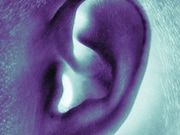Difficulties accessing hearing care services seen particularly in older Americans with lower incomes
THURSDAY, Jan. 10, 2019 (HealthDay News) — Beneficiaries who are dually eligible for Medicaid are less likely to use hearing care services and more likely to report having trouble with their aids, according to a study published in the January issue of Health Affairs.
Amber Willink, Ph.D., from the Johns Hopkins Bloomberg School of Public Health in Baltimore, and colleagues examined existing barriers to accessing hearing care services among older Medicare beneficiaries who owned and used hearing aids. They noted that the Over-the-Counter Hearing Aid Act of 2017 will soon allow people to purchase hearing aids without involvement of an audiologist or dispenser. The authors used data for 2013 from the Medicare Current Beneficiary Survey.
The researchers found that among those using hearing aids, less education and lower income correlated with decreased odds of using hearing care services. The odds of using hearing care services were 30 percent lower for older Medicare beneficiaries with less than a high school diploma versus college graduates. In addition, the odds of using hearing care services were 41 percent lower for beneficiaries who were dually eligible for Medicaid compared with high-income Medicare beneficiaries, and they were twice as likely to report having a lot of trouble hearing with their aids (27 versus 11 percent).
“Hearing aids alone don’t necessarily improve hearing — hearing care services are important too, but there are barriers that prevent many people from accessing those services,” a coauthor said in a statement.
One author disclosed financial ties to the pharmaceutical and medical device industries.
Copyright © 2019 HealthDay. All rights reserved.








